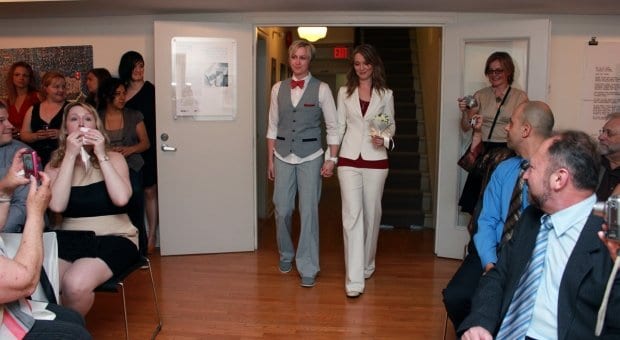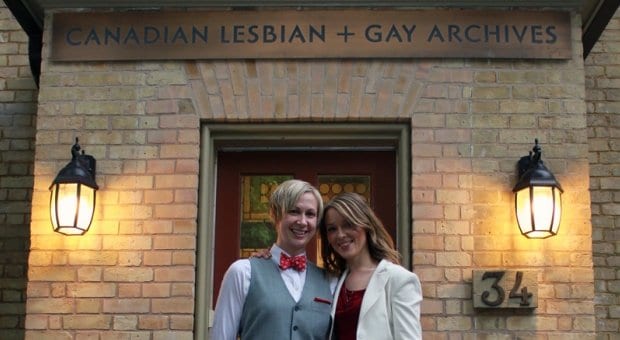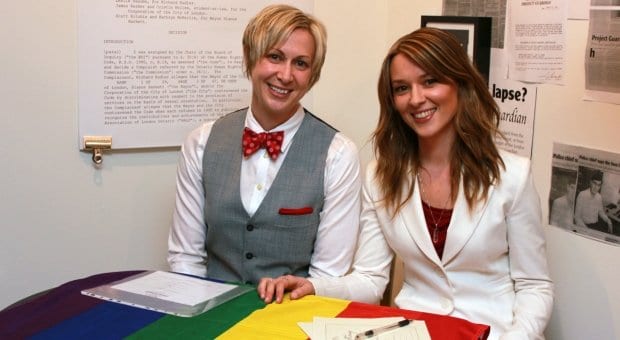
Selina Abetkoff and Ilaneet Goren were married in June at the Canadian Lesbian and Gay Archives in Toronto.

Selina Abetkoff and Ilaneet Goren were married in June at the Canadian Lesbian and Gay Archives in Toronto.
As many younger gays and lesbians venture far from Church Street and write giddy polemics about how post-gay they feel, one couple demonstrated its commitment to the Village, the LGBT community and each other by marrying at the Canadian Lesbian and Gay Archives (CLGA) this summer.
Selina Abetkoff admits she hadn’t heard of the CLGA until her partner, Ilaneet Goren, suggested it as a wedding venue. Abetkoff is not alone, and spreading the word was one of the reasons the couple chose to wed there.
The CLGA started 40 years ago as a single filing cabinet in the office of The Body Politic. Today, it has grown into the world’s second largest LGBT archives, offering photos, audio-visual materials, memorabilia and an international collection of queer and trans periodicals, all squeezed into its yellow-brick Victorian on Isabella Street and a second storage space at Church and Wellesley.
“The archives has so many hidden treasures that I’m sure are just here to be discovered,” says general manager Scott Kettles. He lists R Douglas Elliott’s papers documenting the fight for same-sex marriage, as well as Mark Tewksbury’s 100th anniversary commemorative Olympic torch among his personal favourites.
The couple’s timing was perfect for the archives, which had never hosted a wedding before: 2013 marks not only its 40th anniversary, but 10 years of same-sex marriage in Ontario.
Abetkoff and Goren infused every aspect of the event with their values, ensuring that queer-friendly businesses supplied the services and refreshments and acknowledging in their speeches that legal same-sex marriage is still the exception globally. They also served rainbow cupcakes in lieu of wedding cake.
“It’s the highlight of my time at the archives,” says Kettles, who worked closely with the couple on the wedding. “It was very emotional, very beautiful.”
At the time, the second-floor gallery was featuring an exhibit about Rupert Raj, active in the trans community since the 1970s, and Richard Hudler, a long-time social worker and activist in London.
Goren says one of the wedding’s highlights was seeing her grandmother, who had lived through Soviet repression, dancing and clapping at her gay wedding, surrounded by queer and trans artifacts. Similarly for Abetkoff, one of the most powerful moments was watching her parents interact with the edgier pieces.
“I don’t want them to see some sterilized version of what queer culture is . . . I’m rather vanilla as a lesbian,” Abetkoff jokes, “but I celebrate the people who are boundary pushers.”
Having lobbied for marriage equality a decade earlier, Goren felt like the wedding was a culmination of that work, though she had been conflicted about marriage as an institution and hadn’t expected to get married herself. In fact, when the couple first started dating, one of Goren’s favourite T-shirts read, “Single is the new black.” (Abetkoff insists Goren even wore this on one of their early dates.) But when Abetkoff proposed – seconds after the couple crossed the Pride and Remembrance Run finish line – Goren said yes.
“The selling point for me was when she said, ‘It will be what we want it to be. It will be ours,’” Goren says.
The wedding was a celebration of the progress that has been made, but also a reminder of the work yet to be done, and the couple feels the Village, as a physical space, has an important role to play in this, even as the city beyond grows more welcoming.
“I wanted to live in a place in Toronto where I can walk around with my girlfriend holding hands, and I can take that for granted for a change,” Goren says. “I can’t do that, necessarily, in other parts of the GTA, outside of those queer-positive pockets. Still. We still have a long way to go.”
The CLGA’s current exhibit, Gay Premises, features photos, cartoons and news items from the contributors of The Body Politic and runs until Friday, Sept 6. For more information, go to clga.ca.

 Why you can trust Xtra
Why you can trust Xtra


